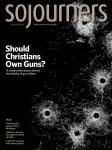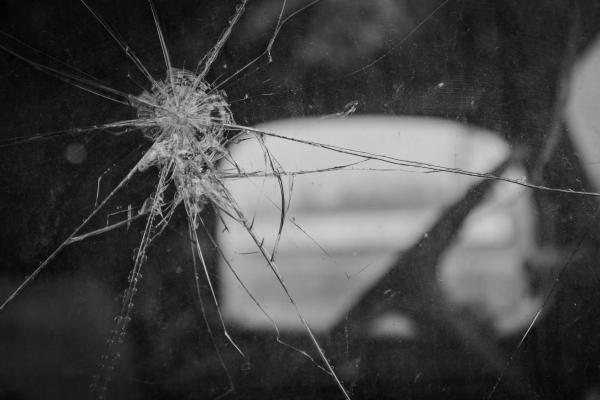SITTING AT A DINING-ROOM TABLE full of fellow evangelical pastors, I asked how many were “carrying” (a euphemism for being armed with a concealed handgun). They all raised their hands. Then I asked, “What determines when you draw your gun and prepare to shoot another human being?” There was awkward body language and mumbling. After a few seconds passed, one older man said, “I’ll tell you what determines whether I draw the gun or not. It’s the man’s skin color.”
I was left speechless by the pastor’s jarring, blatant racism. Still, as respectfully as possible, I asked him to please clarify what he meant.
“Well, we got a big city nearby, and, you know, the black people there are always killin’ people. Now, if a colored man comes into this county, I know he means trouble because he knows he doesn’t belong here. That makes him more dangerous than a white man. That’s why I’d pull my gun.”
The man who was speaking, and the others nodding their heads in agreement, are my colleagues. I am one of them when it comes to a statement of faith—but not when it comes to race and guns.
‘Surrendering my life to Christ’
When I speak of evangelicals, I am speaking of my own. I surrendered my life to Jesus Christ as my lord and savior 42 years ago. I attended an evangelical Bible college and seminary and was ordained as an evangelical minister. I poured myself into evangelism and disciple-making. Today I’m a missionary to top government officials in Washington, D.C., and I chair one of the oldest associations of evangelical clergy in the country. I love my Lord, I love his people, and I love doing God’s work.
This is why I’m deeply concerned about American evangelicals. I believe the increased presence of firearms among American evangelicals, including pastors that are now armed in the pulpit and ready to shoot into the congregation if necessary, signals a serious moral crisis in the church. Those who should be all about the good news of God’s saving love for humanity are instead being led astray by a popular gun culture that contradicts the teaching and model of Jesus and the apostles.
White evangelicals, as a subgroup, have one of the highest rates of gun ownership and are least likely to support any type of gun regulation. We are also overwhelmingly Republican and politically conservative, making us particularly good recruitment prospects for pro-gun affinity organizations and lobby groups.
Facing a theological crisis
This pro-gun enthusiasm presents us with a temptation to abandon our faith in the one true God and trade it for a neo-pagan, fear-driven, earth-bound religion. This theological crisis is why I agreed to become one of the subjects of a documentary film exploring evangelicals and the gun-culture phenomenon. Since its release in 2015, The Armor of Light, by director Abigail Disney, has been screened at film festivals and in theaters and churches, and it is part of a PBS primetime Independent Lens series on faith, deceit, guns, and power.
Having said all this, please don’t get me wrong; I am not completely “anti-gun.” In fact, I see a need for guns to maintain an orderly society, but this is something to be deeply regretted, not celebrated. What concerns me is a form of radical, gun-centered populism that promotes the idea of just about anyone brandishing a firearm in the name of personal self-defense, but without a serious, biblically oriented discussion of the moral and ethical implications of a Christian using deadly force.
The primary problem with evangelicals and guns is not the instrument itself, per se, but the attitudes that attend to its use. (Although in accidental shootings, including by children, I would argue that it is the instrument itself that is the problem.) Whenever someone intentionally carries a deadly weapon, he or she must be ready to kill. A military-trained firearms instructor explained it to me this way: “If you are not ready to kill, you are more dangerous with the weapon than without it, because it will likely be taken from you and used to kill you and others.”
Whom shall I kill?
Readiness to kill changes our disposition toward others. We must view the people around us through a lethal lens, asking, Whom will I kill? When will I kill? For what will I kill?
In carrying a gun for protection, one must also risk killing the wrong person, either because one shoots mistakenly or unjustifiably or because somebody is killed by a stray bullet. Such a disposition toward other human beings seems to me contradictory to three paramount New Testament principles: Love of neighbor, love of enemy, and fear of God only.
When Jesus was asked about the “greatest commandment,” he said there were actually two at the top of the list: “Love God” and “Love your neighbor as yourself.” The second means we’re to place our relationships to our fellow human beings above everything but God. The implications of this are myriad and profound, not the least of which is our respect for the sanctity of the other’s life.
Over the last several decades, evangelicals have formed a deep and biblically informed pro-life consensus. To be pro-life means we place the highest value on every human life, not on only some.
In the Sermon on the Mount, Jesus went on to say that we’re to value even the life of our enemy. This command was to be normative in the life of a Christian. The very rare act of sanctioned human killing, even if defensive during a violent confrontation, is, accordingly, abnormal.
Gun ownership: Right or choice?
The contemplation of taking another human life requires that we dehumanize certain people in our minds and hearts (as my colleagues did around the dining-room table). We must mentally place them into a “disposable class.”
This is where I’ve detected an inversion in the pro-life/pro-choice arguments. I’ve heard defenders of unrestricted gun rights use phrases such as “It’s my choice when it comes to how I defend myself or my family” and “Don’t impose your morality on me.” I think this gets at the heart of this problem. While abortion-rights advocates turn the unborn child into an impersonal “fetus,” gun-rights advocates turn a real or imagined attacker into a “threat,” “target,” “center mass,” or “head shot.”
This depersonalization leads to a false idea that it’s not a life that’s been taken, only a “threat” that has been “neutralized.”
Valuing human life requires we assiduously maintain respect for the humanity of every person, including his or her identity as a creation of God made in God’s image (Genesis 1:27). Christians are in the business of preserving human dignity and human life. “Packing heat” runs counter to this discipline. A gun is a cheap substitute (and dangerous shortcut) to preserving and protecting human life and, I argue, presents a constant temptation to do the opposite. The gun creates an allure for its owner to become the most powerful person in any encounter with another individual. In fact, the possession of a deadly weapon creates the illusion that the gun owner dominates all others in any given space. Yet Jesus tells us, “Not so with you. Instead, whoever wants to become great among you must be your servant” (Mark 10:43).
In the one and only instance in which Jesus appears to approve of his disciples acquiring deadly weapons (Luke 22:38), they say to him, “Lord, look, here are two swords.” He responds emphatically, “It is enough!” In other words, Jesus didn’t endorse a civilian militia armed to the teeth with any number or kind of weapons. He implicitly placed a limit on the number and type of weapons they could possess. This is analogous to how society generally limits the use of defensive firearms to a relative few police officers and military service members. In other words, it’s not everyone with a gun, ready to shoot anyone, under any circumstances; rather, it’s only a few with guns, and they are highly trained, highly regulated, and held highly accountable for the lethal use of their weapons. This is a diminution of human power. To arm every citizen—to arm every church member—is, instead, an inflation of human power.
Of whom shall I be afraid?
In a pastoral sense, my concern is not simply the inherent physical danger presented by a population awash with weaponry but also the psychological damage done to the shooter in the wake of a fatal shooting. Even in the most legally justifiable killings, trauma, guilt, remorse, and regret are left in the aftermath. Military chaplains refer to this effect as “moral injury.” I’ve worked with military personnel and law enforcement officers that have suffered this emotional and spiritual damage. Killing in real life is nothing like it is portrayed to be in films or video games. The stress and depression that result from the killing act, as well as self-doubt, self-condemnation, and vivid, uncontrollable recall too often contribute to addictions, the demise of intimate relationships, and suicide.
Related to this realm of mental, emotional, and spiritual health is the role of fear in the evangelical rush toward guns. My research indicates that the primary interest in defensive gun ownership and use among evangelicals is driven by fear of everything from home invasions and carjacking to end-times, apocalyptic persecution of Christians. Church leaders often tell me their congregants are afraid that a child will be kidnapped, wives and daughters will be raped, a crazed gunman will open fire on their congregations, or ISIS terrorists will target Christians wherever we may be.
The Bible is clear on God’s will for God’s people when it comes to fear. From beginning to end, scripture is replete with divine pronouncements to “fear not.” Nowhere is this instruction clearer, more authoritative, or more relevant to our subject than in the words of Christ: “I tell you, my friends, don’t be terrified by those who can kill the body but after that can do nothing more. I’ll show you whom you should fear: Fear the one who, after you have been killed, has the authority to throw you into hell. Indeed, I tell you, that’s the one you should fear” (Luke 12:4-5).
For a Christian to transfer fear from God to an earthly entity is to commit a form of idolatry. Trading our trust in divine protection for a fantastical pearl-handled revolver and silver bullet is to exchange the heavenly for the earthly. In an Advent sermon I preached on this subject at the Washington National Cathedral, I summarized this point by asking: “Who will ultimately save us, Jesus or something else? Christ or a Glock? Will our salvation be of our own making or will it be of ‘The Lord our Righteousness’”?
In respecting the Second Amendment, we must be careful we don’t violate the second of the Ten Commandments, which prohibits the worship of idols made by human hands.
State of emergency
The ownership and use of firearms for personal protection by Christians is far from a simple subject. The proliferation of “defensive” firearms in the evangelical community, including more and more in the sanctuary, presents profoundly consequential moral and ethical questions. It may also indicate a failure of faith. The flippancy shown by some well-known evangelical personalities when discussing guns has certainly not served well our witness for the gospel, and it may be contributing to a spiritual crisis. The silence of church leaders on this subject has done nothing to ameliorate the severity of the problem.
This disease of the heart must be eradicated lovingly, pastorally, and biblically. It is past time for pastors, theologians, Bible teachers, and Christian ethicists to take up the issue of guns and lethal personal defense among the people of God as a theological emergency.

Got something to say about what you're reading? We value your feedback!

